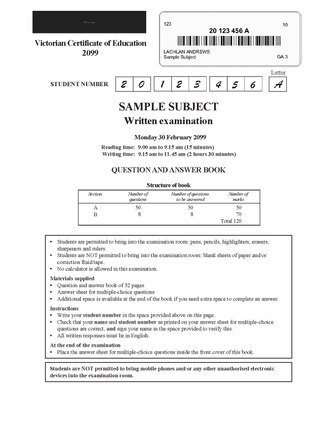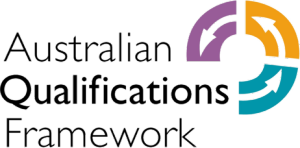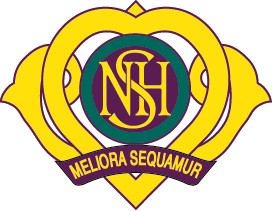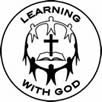Technical and further education or simply TAFE is the common name in English-speaking countries in Oceania for vocational education, as a subset of tertiary education. TAFE institutions provide a wide range of predominantly vocational courses.
Education in Australia encompasses the sectors of early childhood education (preschool) and primary education, followed by secondary education, and finally tertiary education, which includes higher education and vocational education. Regulation and funding of education is primarily the responsibility of the States and territories; however, the Australian Government also plays a funding role.

The Victorian Certificate of Education is one credential available to secondary school students who successfully complete year 11 and 12 in the Australian state of Victoria as well as in some international schools in China, Malaysia, Philippines, Timor-Leste and Vietnam.
Koonung Secondary College is a secondary state school in Mont Albert North, Victoria, in the eastern suburbs of Melbourne, Australia. The school takes its name from the nearby Koonung Creek.

The Australian Qualifications Framework (AQF) specifies the standards for educational qualifications in Australia. It is administered nationally by the Australian Government's Department of Industry, with oversight from the States and Territories, through the Standing Council of Tertiary Education Skills and Employment. While the AQF specifies the standards, education and training organisations are authorised by accrediting authorities to issue a qualification.

Northcote High School is a co-educational, state secondary school in Northcote, Victoria, Australia. It is situated at the southern end of the City of Darebin, on St Georges Road, Northcote.

The Victorian Curriculum and Assessment Authority (VCAA) is a statutory authority of the Victoria State Government responsible for the provision of curriculum and assessment programs for students in Victoria, Australia. The VCAA is primarily accountable to the Victorian Minister for Education. It is also responsible to the Minister for Training and Skills and the Minister for Families and Children in relation to sections of Part 2.5 of the Education and Training Reform Act 2006.
The Victorian Certificate of Applied Learning (VCAL) is a 'hands-on' program for students in Years 10, 11, and 12 and is a credential awarded to secondary school students who successfully complete year 11 and 12 in the Australian State of Victoria since 2002. The VCAL gives students practical work-related experience, as well as literacy and numeracy skills and the opportunity to build personal skills that are important for life and work.

The Australian National Aboriginal and Torres Strait Islander Education Policy (AEP) is a national policy adopted by the Government of Australia by each State and Territory government. The policy was first introduced in 1989 and is the foundation of education programs for all Indigenous Australians.
LOTE or Languages Other Than English is the name given to language subjects besides English in Australia, New York City, and other schools. The name evolved from 'heritage language', a term first used to refer to languages other than French and English in Canada. Later modified in relation to Australia to refer to languages other than English. LOTEs have often historically been related to the policy of multiculturalism, and tend to reflect the predominant non-English languages spoken in a school's local area, the idea being to play a part in the maintenance of cultural identities in local communities.
Bundoora Secondary College is a public secondary school for girls and boys in years 7 to 12, and is located in a residential block on the corner of Balmoral Avenue and Moreton Crescent in Bundoora, a suburb of Melbourne, Australia.

Chairo Christian School is a multi-campus co-educational private, non-denominational Christian School with campuses in Drouin, Victoria, Drouin East, Pakenham, Victoria, Leongatha, Victoria, and Traralgon, Victoria.

Education in Victoria, Australia is supervised by the Department of Education and Training (DET), which is part of the State Government and whose role is to "provide policy and planning advice for the delivery of education". It acts as advisor to two state ministers, that for Education and for Children and Early Childhood Development.
The Access Yea Community Education Program (AYCE) is an innovative high school educational program in Victoria, Australia that is designed to help school leavers and other students who do not fit into the regular school system.
Teaching in Victoria, Australia is regulated by the Victorian Institute of Teaching, through the Department of Education and Training (DET), which is part of the State Government. The DEECD is biggest operator of schools in the state, and along with the independent and Catholic school systems have an interest in teaching as the operator of schools and employer of teachers.
The Senior Secondary Certificate of Education (SSCE) is the graduation certificate awarded to most students in Australian high schools, and is equivalent to the Advance Placement in North America and the GCE A-Levels of the United Kingdom. Students completing the SSCE are usually aged 16 to 18 and study full-time for two years. In some states adults may gain the certificate through a Technical and Further Education college or other provider.

The Australian Tertiary Admission Rank (ATAR) for all domestic students, or the ATAR-based Combined Rank (CR) for all International Baccalaureate (IB) students, are the primary criteria for determining the Selection Rank (SR) for admission into undergraduate courses in Australian public universities. Domestic Students are students who are Australian or New Zealand citizens, or Australian permanent residents, or the holder of long-term refugee visa. ATAR & CR are not applicable for international students as they must apply directly to each university separately and their SR is calculated by the university. The ATAR is calculated by each state or territory's own state-level Tertiary Admission Center (TAC) for all domestic students studying within their geographical limits. Interstate Domestic Students must apply to the TAC of their respective state. The Selection Rank is calculated by each University separately based on the ATAR or CR as well as additional points for each university's unique criteria such as a student's educational disadvantage or subject performance. ATAR is not a mark, but rather a percentile ranking between 0.00 and 99.95 which shows the student’s relative position compared to all other students in the range of 16 to 20 years old who would have completed their respective year 12 exams in that state in a year.

The Digital Education Revolution (DER) was an Australian government–funded educational reform program, promised by then prime minister of Australia Kevin Rudd during the launch of his 2007 Australian federal election campaign in Brisbane. It was officially launched in late 2008, with the first deployments announced by then Deputy Prime Minister of Australia and Minister for Education, Employment and Workplace Relations, Julia Gillard and then New South Wales counterpart, Verity Firth. The first deployment took place at Fairvale High School in August that year.

Kevin John Donnelly is an Australian educator, author and commentator. He is Senior Fellow at the Australian Catholic University's PM Glynn Institute









